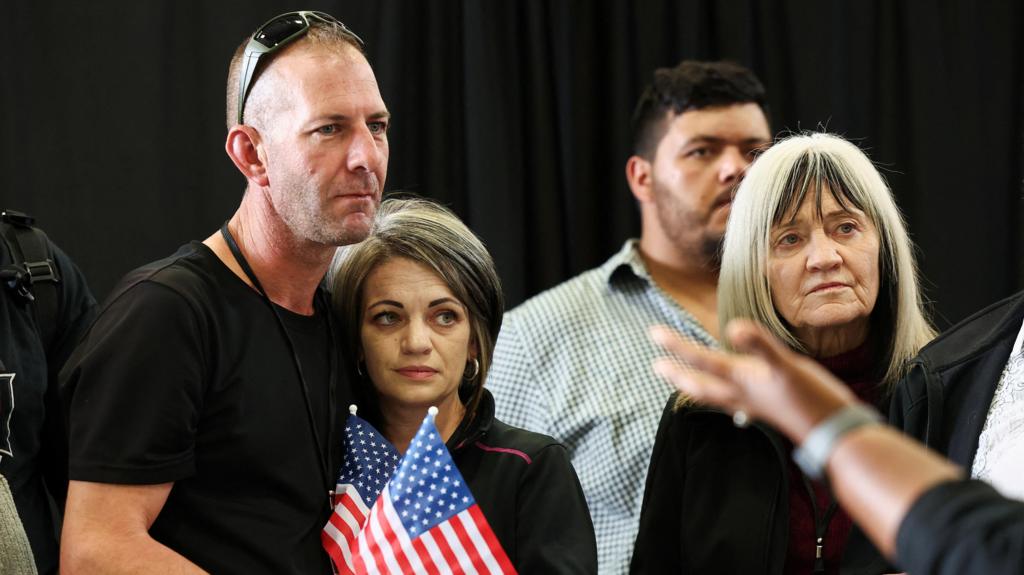Fifty-nine South African citizens of Afrikaner descent have arrived in the United States and been granted refugee status.
President Trump attributed the expedited processing of their applications to alleged racial discrimination against this minority group, citing instances of persecution.
The South African government contests this assertion, stating the group does not meet the criteria for refugee status.
This action stands in stark contrast to the Trump administration’s suspension of all other refugee admissions, including those fleeing warzones. Human Rights Watch has criticized this as discriminatory, noting the denial of refuge to numerous other applicants, many of whom are Black and Afghan refugees.
Upon arrival at Dulles International Airport near Washington, D.C., on Monday, the group received a welcoming reception from US authorities, with some waving small American flags amidst celebratory decorations.
While refugee processing typically takes months or even years, this group’s applications were fast-tracked. The UNHCR confirmed it was not involved in their vetting process, a departure from standard procedure.
When questioned about the expedited processing, President Trump referenced an ongoing “genocide” targeting white farmers in South Africa, emphasizing that the victims’ race was inconsequential to his concern.
However, South African President Cyril Ramaphosa refuted this claim during a phone call with President Trump, asserting that the situation did not meet the criteria for refugee status under international law.
Ramaphosa clarified that refugee status requires demonstrable fear of political, religious, or economic persecution – a condition he stated did not apply to this group.
In response, Deputy Secretary of State Christopher Landau remarked that it was unsurprising that a country of origin would contest the refugee claims of its citizens.
The US has publicly criticized South Africa’s domestic policies, specifically its land reform initiatives, which involve the potential seizure of land from white farmers without compensation.
In January, President Ramaphosa signed legislation enabling the government to seize privately owned land without compensation under specific circumstances deemed equitable and in the public interest.
However, the South African government maintains that no land has been seized under this legislation to date.
Frustration persists in South Africa regarding the slow pace of land reform since the end of apartheid, with a significant disparity in land ownership between the Black majority and the white minority.
Elon Musk, a close advisor to President Trump, previously made claims of a “genocide of white people” in South Africa, echoing accusations of racist ownership laws.
These claims of genocide have been widely refuted.
Representative Gregory Meeks, the ranking Democrat on the House Foreign Affairs Committee, characterized the administration’s actions as a “politically motivated rewrite of history” and more than just a racist dog whistle.
The Episcopal Church has announced it will cease collaboration with the federal government on refugee resettlement, citing the preferential treatment afforded to the Afrikaner group.
Vice President JD Vance succinctly commented on the situation on X, stating “Crazy”.
Melissa Keaney, an attorney with the International Refugee Assistance Project, criticized the White House’s decision as hypocritical and indicative of unequal treatment, given the ongoing suspension of the USRAP program.
Her organization is currently suing the administration over the indefinite suspension of the USRAP, which has left over 120,000 conditionally approved refugees in a state of uncertainty.
Afrikaner author Max du Preez dismissed claims of white South African persecution as absurd and baseless.
South African police data from 2024 recorded 44 farm murders, with eight victims being farmers. While South Africa doesn’t provide race-specific crime statistics, the majority of farmers are white, while farm laborers are predominantly Black.
US-South African relations have been strained since President Trump’s initial directive to resettle Afrikaners, culminating in the expulsion of South Africa’s ambassador to the US in March following accusations of “race-baiting”.
Further complicating the relationship, the US has criticized South Africa’s stance against Israel at the ICJ, where Pretoria accused Israel of genocide against Palestinians, a claim Israel vehemently denies.
President Trump’s decision to prioritize Afrikaner refugees stands in contrast to the broader US crackdown on migrants and asylum seekers from other regions.
Additional reporting by Khanyisile Ngcobo in Johannesburg & Cai Pigliucci in Washington DC
Go to BBCAfrica.com for more news from the African continent.
Follow us on Twitter @BBCAfrica, on Facebook at BBC Africa or on Instagram at bbcafrica
An ex-MP was ordered to pay $18m, but a judge rules that the amount was “disproportionate”.
The foreign minister says raising concerns publicly amounts to interference in domestic affairs.
Kagiso Rabada is in South Africa’s squad for next month’s World Test Championship after completing a ban for recreational drug use.
A US-funded flight carrying a group of 59 refugees landed in Virginia on Monday after leaving Johannesburg on Sunday.
More jihadist attacks were reported over the weekend, said to have led to dozens of casualties.

